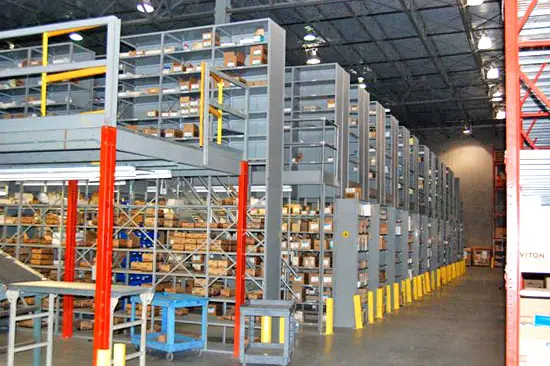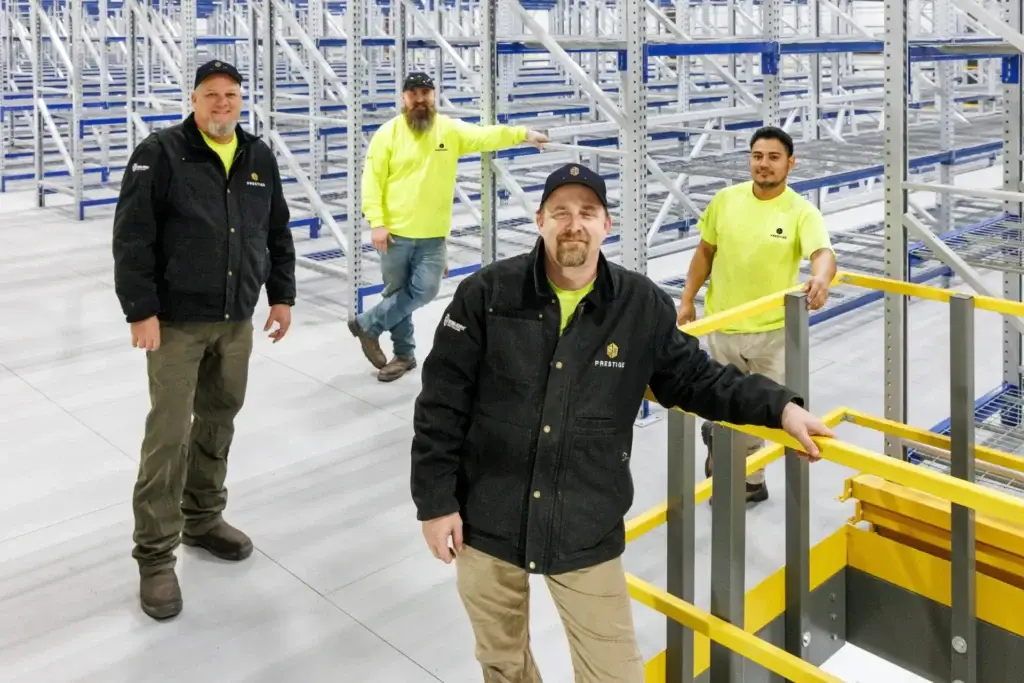Industrial Shelving & Cabinets

Elevate Warehouse Storage
Enhance Space, Inventory, and Productivity
Efficient warehouses are critical in today’s fast-moving logistics and supply chain management world. Industrial shelving systems optimize storage space, inventory management, and operational productivity. By choosing the right shelving solutions, businesses can streamline processes, reduce downtime, and maximize their ROI. Let’s explore how these systems can revolutionize warehouse operations, providing insights into shelving types, materials, customization options, and industry-specific applications.
Different Types of Industrial Shelving & Cabinet Systems
At a high level, industrial shelving is a static storage medium for hand-loaded products in a facility. In many cases, shelving forms the backbone of efficient warehouse storage. These storage structures are designed to withstand heavy loads while providing easy access to stored items. In commercial and industrial settings, industrial shelving systems are engineered for durability, flexibility, and maximum space utilization.
- Open Shelving Systems: Open shelving are the most economical systems and offer unobstructed access from all sides, making them ideal for high-turnover inventory. These systems promote visibility and air circulation, which are crucial for certain goods.
- Closed Shelving Units: Closed shelving units offer additional protection for stored items, shielding them from dust and light. These systems are particularly useful for sensitive materials or environments with a desired cleaner aesthetic.
- Modular Drawer Shelving: Modular drawers can be easily reconfigured to accommodate changing storage needs, providing flexibility and customization. When coupled with partitions and dividers, storage within modular drawer shelving can be optimized.
- Bin Shelving: Bin shelving combines the accessibility of open shelving with the organization of individual bins. This system is perfect for storing small parts or components, offering quick retrieval and easy inventory management.
- Bin Cabinets: For businesses requiring secure storage of small items, bin cabinets offer an excellent solution. These units feature lockable doors, protecting valuable inventory while maintaining the organizational benefits of bin storage.
Customization Options
Customization options are essential for creating storage solutions that perfectly match your unique needs. A range of flexible features allows you to tailor your commercial shelving systems, providing optimal space utilization and efficiency for your operations.
- Adjustable Shelf Heights: One key advantage of modern warehouse shelving is the ability to adjust shelf heights. This feature allows warehouses to optimize vertical space and accommodate items of varying sizes.
- Modular Components for Scalability: Scalability is crucial in growing businesses. Modular components allow for easy expansion or reconfiguration of shelving systems.
- Accessories (Dividers, Bins, Drawer Inserts): Accessories enhance the functionality of industrial commercial shelving. Dividers create organized compartments, bins offer removable storage options, and drawer inserts provide secure storage for smaller items.
Industry-Specific Applications
Industrial shelving isn’t a one-size-fits-all solution; different industries have unique storage requirements. From bustling warehouses to compact retail backrooms, each sector demands tailored storage solutions. Let’s explore how warehouse shelving systems can be adapted to meet the needs of various industries, enhancing efficiency and organization across diverse business environments.
- Warehouse and Distribution Centers: In large-scale warehouses and distribution centers, industrial shelving systems form the core of inventory management. High-capacity shelving and strategic layout planning can reduce picking times and improve efficiency.
- Manufacturing Facilities: Manufacturing environments benefit from commercial shelving that can handle heavy duty components and tools. Robust shelving solutions are designed to withstand the demands of industrial settings while providing easy access to necessary materials.
- Retail Backrooms: Retail backrooms require a balance of storage density and accessibility. Shelving systems in these spaces often incorporate a mix of bin storage for small items and larger shelves for boxed inventory, optimizing space in typically constrained areas.
- Automotive Parts Storage: The automotive industry relies on efficient parts storage for manufacturing and aftermarket services. Industrial commercial shelving in this sector often features specialized configurations to accommodate oddly shaped components and facilitate quick retrieval.
Unlock the potential of your storage space – Contact our team for a free consultation!
Space Optimization Strategies
Effective space optimization goes beyond simply installing shelves; it requires a strategic approach to layout, vertical space utilization, and system integration. Space optimization strategies can help you unlock the full potential of your storage areas, boosting efficiency and capacity without expanding your physical footprint.
- Vertical Storage Maximization: Maximizing vertical space is key to efficient warehouse design. When combined with appropriate material handling equipment, two-level shelving systems can be introduced, dramatically increasing storage capacity without expanding the warehouse footprint.
- Aisle Layout Considerations: Proper aisle width and layout are crucial for optimizing storage density and accessibility. Experts can help design a shelving layout that balances these factors, ensuring efficient picking routes and forklift maneuverability.
- Integration with Other Storage Systems: For comprehensive warehouse solutions, commercial shelving often integrates with other storage systems like pallet racks or automated storage and retrieval systems (AS/RS).
Choosing the Right Shelving
Selecting the appropriate warehouse shelving requires careful consideration of several factors, including the capacity requirements for heavy loads, the types of items to be stored, the available space and layout, the frequency of access needed, and the potential for future expansion, along with compliance with safety regulations.
Industrial shelves are more than just storage solutions; they are strategic assets that can significantly enhance warehouse efficiency and productivity. By choosing the right type of shelving, optimizing space utilization, and tailoring solutions to specific industry needs, businesses can transform their operations. Prestige, with its decades of experience and comprehensive range of industrial commercial shelving options, stands ready to help organizations maximize their storage potential and achieve new levels of operational excellence.
The Future of Shelving Systems
Modula Vertical Lift Modules (VLMs) represent the next generation of shelving, bringing advanced automation and space optimization to modern storage solutions. Unlike traditional shelving, Modula VLMs maximize vertical space, delivering items directly to operators with minimal effort. This not only enhances productivity but also ensures that your facility is using its space as efficiently as possible.
Space-Saving Design: Modula VLMs utilize vertical storage to increase capacity while reducing the need for expansive floor space.
Automated Retrieval: Items are brought directly to the operator, cutting down on retrieval time and improving workflow efficiency.
Custom Fit: These systems can be tailored to the unique needs of your warehouse, offering a scalable solution for various storage requirements.
- Seamless Integration: Modula VLMs can be integrated with existing warehouse management systems to synchronize inventory tracking and enhance overall operational efficiency.

Behind the Shelves
The Prestige Legacy of Innovation
At Prestige, we’re more than just a supplier—we’re your partner in optimizing space and enhancing efficiency. As the largest stocking distributor of Lyon Workspace Products in the Southeast, we offer an unparalleled inventory that allows us to meet your needs quickly and cost-effectively.
Our journey is marked by a commitment to quality, integrity, and adaptability. We’ve grown from serving niche markets to providing comprehensive solutions for institutions, government agencies, and businesses across various industries. Our expertise spans from traditional storage solutions to cutting-edge automated storage systems, ensuring we can address any storage challenge.
What sets us apart is our dedication to customized solutions. Our team of experts works closely with you to understand your unique needs, designing and implementing storage systems that maximize your space and streamline your operations. From initial consultation to installation and aftermarket service, we’re with you every step of the way.
FAQ
Commonly Asked Questions
What is the weight capacity of commercial shelving?
The weight capacity of commercial shelving varies depending on the design and materials used. Typical capacities range from 300 to 1,000 pounds per shelf, with some heavy-duty options supporting up to 2,500 pounds or more per level. Consult manufacturer specifications and adhere to ratings for heavy loads to ensure the safety and longevity of the shelving system.
How do I organize my industrial shelves?
To organize industrial shelves effectively, start by categorizing items based on their type, size, or frequency of use. This approach allows for logical grouping and easier retrieval. Next, implement a clear and consistent labeling system to ensure quick identification of items, reducing search time and errors. Place frequently accessed items at easily reachable heights to improve efficiency and reduce worker strain. Use bins or dividers to keep smaller items organized and prevent mixing. Finally, regularly review and adjust your organization system to maintain efficiency as inventory and business needs change. This ongoing process ensures your shelving organization remains optimized for your current operations.
What is the difference between industrial and commercial shelving?
Industrial shelving is designed for heavy duty use in warehouses and manufacturing environments, typically supporting higher weight capacities and offering more robust construction. While still sturdy, commercial shelving is generally lighter duty and often used in retail or office settings. Commercial shelving prioritizes functionality and durability, while commercial shelving may also consider aesthetics for customer-facing areas.
